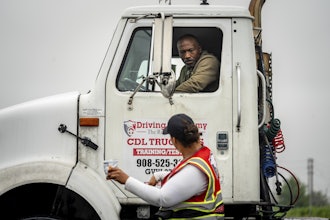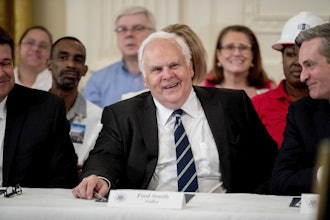CINCINNATI (AP) -- Officials in a southwest Ohio city hope a plan for branding the city as immigrant-friendly will help bolster a shrinking population and rejuvenate its ailing economy.
City commissioners in Dayton approved what City Manager Tim Riordan said is a framework for creating a more welcoming atmosphere at a time when all segments of the population are needed to help the city grow and prosper.
"Immigrants are already here, and banks, hospitals, police and landlords have been dealing with language and cultural issues," Riordan said. "But I think we can do better."
The hope is to entice immigrants to live in Dayton and invite others of their nationality to join them, increasing the population and establishing businesses that would create jobs in an area hurt by lost manufacturing and other employment.
"For a Midwest city like ours that has been hard-hit, this is a way to grow," Riordan said.
In a decade that included the loss of major corporate employer NCR Corp., Dayton's population dropped by about 15 percent from roughly 166,000 in 2000 to nearly 142,000 in 2010, according to U.S Census figures. The proportion of foreign-born residents is relatively small, just under 4 percent, or about 5,000, according to a 2010 Census survey.
Some planned recommendations aimed at boosting that number include increasing interpreter services in courts, government and health care agencies; creating a neighborhood district as a center for immigrant businesses; and recruiting tutors to help with language and literacy issues.
Riordan said he has received some critical e-mails -- most from outside Dayton -- concerned that the community-wide initiative will attract illegal immigrants, but he says the plan is not about that.
"What we are trying to do is help hard-working people and our city," he said. "We don't view it as our job to enforce immigration law."
Steve Salvi, founder of Ohio Jobs & Justice PAC, is critical of the plan he believes will attract illegal immigrants to Dayton and possibly other parts of the state.
"If Dayton wants to help build its economy by letting people know that illegal immigrants are welcome, that's their prerogative," Salvi said. "But when they accept a plan that clearly has the purpose of including those people, that's a problem for everyone."
Salvi objects to a proposed municipal identification card for immigrants who are ineligible for other identifying documents needed to access banking, health care and other services and said only illegal immigrants would fall into that category.
He also opposes the recommendation for "immigrant-friendly" law enforcement proposals limiting checks of immigration status to those suspected of serious crimes only.
"They can't pick and choose which laws to enforce," Salvi said.
City officials will review all of the recommendations to determine which ones are to be implemented as they are rolled out over several years.
Immigrant Festus Nyiwo, a former attorney from Nigeria now attending an area college, welcomed the plan.
"Immigrants are hard workers with a propensity to create jobs, and this will invigorate the economy," he said.
Ismail Gula, a native of Libya and a part-time teacher at the University of Dayton, strongly favors recommendations that would reduce barriers to immigrant business development.
"This plan is not meant to draw illegals, but to help those here legally develop businesses and contribute to their city," he said.
Dayton is not alone in trying to integrate immigrants into the mainstream community.
The city of Columbus began an initiative in 2004 aimed at helping immigrants navigate government and other services, and officials there consider it a success.
"We try to work with all persons coming into our city to help them get on their feet and become thriving citizens," said Napoleon Bell, executive director of that city's Community Relations Commission.
Columbus was among 20 cities recognized last year by the National League of Cities for successful efforts to integrate immigrants into their mainstream communities.
"What is happening in Dayton is happening in more cities as demographics change and populations become more international," said Ricardo Gambetta, NLC's immigration integration manager. "This integration takes time and requires community-wide effort."













![7 001[1]](https://img.manufacturing.net/mindful/im/workspaces/default/uploads/2025/06/7-0011.S7Uqlbb3HV.jpg?auto=format%2Ccompress&crop=focalpoint&fit=crop&fp-x=0.53&fp-y=0.44&h=220&q=70&w=330)








